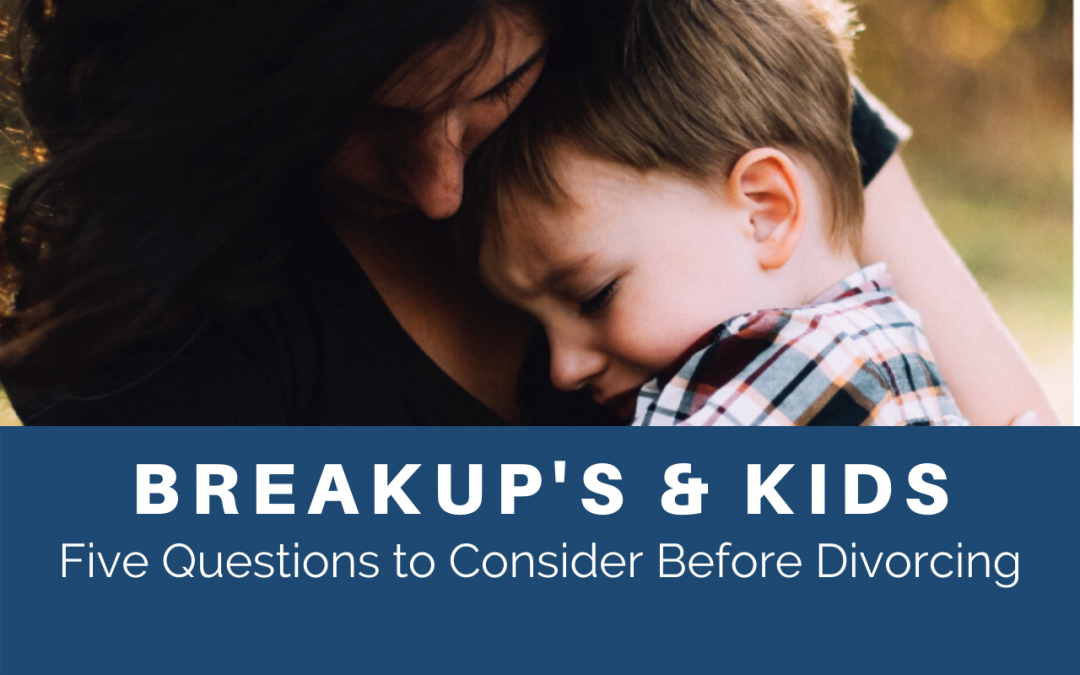Divorce is always harder with kids in the mix. No parents take the issue of kids and divorce lightly, even when it is the right decision. If you are a parent, and considering separation with kids, my heart goes out to you for all that you are holding.
Divorce is sometimes the best decision for everyone. Nevertheless, I also witness in my therapy practice some couples can also recover back to a thriving relationship. As you contemplate all the factors, ask these questions before divorcing:
#1. Were you compatible before becoming parents?
Consideration of kids and divorce often raises questions of compatibility. Many parents at risk for separation or divorce can draw a line in the sand for how their relationship functioned before and after children.
“We never used to fight very much.”
“Since having kids, it’s hard to see what we ever had in common.”
The transition to parenthood can be very hard on relationships.
Before assuming you have a compatibility issue in your new life, consider how compatible you used to be. What shared values, interests and personality traits brought you together? If the list is long, but it feels like you can’t find those compatibilities anymore, then there is reason to be hopeful.
Can Personalities Change After Kids?
The research consistently shows that personalities don’t change that much over time (Cobb-clark, Schurer 2012).
The pressures of parenthood have not changed your compatibility but rather obscured it with cycles of emotional disconnection.
With time and practice, you can learn skills to reverse and prevent those negative patterns. When messy, confusing communication stops taking over the little bit of time you have, you will likely discover your compatibility is still alive and well.
#2. Have you been working at the deepest levels of change?
Since becoming parents, you are working harder at this new life than you have ever had to. You are maxed out. You might feel concerned, irritated, frustrated or angry sometimes. In an attempt to do the right thing, you try to communicate with your husband, wife or partner about those feelings.
Unfortunately, things sometimes get worse from there. Depending on how you approach things, your communication might be met with defensiveness, reactivity or shut down. Getting stuck there again and again lead some couples to consider breaking up.
One of the secrets of getting back to a loving, close bond is to make sure your efforts are working at the deepest level of the problem.
What Other Emotions Are Under the Anger?
Become aware of your emotions before acting them out. If anger is there, tap into the emotions underneath the anger. Underneath most anger, we have softer and more vulnerable feelings like fear, sadness and overwhelm.
If you learn to tap into those softer feelings and share them instead of anger, it will be much easier for your partner to hear you and respond positively.
#3. Have you learned mindfulness and emotional regulation skills?
Many bad moments in a relationship come down to both people getting emotionally triggered and reactive. Once the sleeplessness, time restrictions and loud toddlers are added to the mix, the rate and intensity of disconnection usually increases. This can express as outward anger, emotional shutdown or both. When the emotional reactivity starts to bounce back and forth, with little time to recover, the couple gets stuck.
The good news is that we can reduce emotional reactivity through self-growth practices of mindfulness and meditation. If either or both partners improve their emotional regulation, the whole negative cycle is stopped in its tracks.
Mindfulness Practice
I recommend practicing mindfulness throughout your day-to-day life. When you are in line at the bank or walking down the street, take a few intentional minutes to practice mindfulness. Take 5 minutes to be present and aware in your five senses without following thoughts. When you get pulled into thoughts, compassionately bring yourself back to your five senses. Over time you will be cultivating more awareness and choice in how reactive you are and cultivate the capacity to quickly settle emotional reactivity. For more information, click here for my article on self-growth.
#4. Would you really be happier without your partner considering what you are giving up?
In this step I ask that you take time to really explore why you want to break up. We usually imagine that we would be happier after separation, but that is not always the case. Happiness is a feeling. Our feelings are highly affected by our thoughts and automatic reactions. Consider if there are other ways back to happiness besides breaking up.
Take the time to really take stock of the bigger picture. What are the blessings of this relationship and this person that you might take for granted? Take time to visualize losing your husband, wife or partner in an unexpected accident. What would you and your kids miss about them and the life that you have now?
Consider them at their best
Instead of deciding to breakup from a place of reaction and anger. Take time to really remember the best of your partner. If from that place, family separation still feels like the right choice, then it will be a much stronger choice. Whether or not you are happier, the decision will clear and well considered.
#5.Have you exhausted all avenues of change?
If you have read through these questions and are inspired to keep trying, then I encourage you to follow these steps for relationship repair.
Online Relationship Course:
I have a free course to help people thrive in marriage after kids. Whether or not your husband or wife or partner wants to join you, there are many pieces you can learn with guided self-growth that can lead to the positive breakthroughs you need.
Hold me Tight:
This step by step book by Dr. Sue Johnson will offer you incredible insight into how to understand your problems and move toward positive transformation.
Consider Returning to Couples Therapy:
Even if you have already gone to couples’ therapy without success, I want to encourage you to try someone new. Seek out a therapist trained Emotionally Focused Therapy (EFT).
Kids and Divorce: Is divorce always bad for kids?
The research is quite positive for some kids in divorce (Benson, 2014). What is most damaging to kids is not the divorcing itself, but the toxic dynamics. High levels of conflict between parents is bad for children. If divorce leads to the reduction of that conflict then it can be a positive development for some children.
Imagine that no matter how you feel about your ex, your child’s identity is wrapped up with both parents. Anytime you speak badly about your ex, it causes your children personal stress.
Psychological Effects of Divorce on Children
Divorce can affect the psychological development of children in many ways. Kids who experience family separation can have decreased school achievement, increased mental health problems, increased health problems, and reduced self-esteem. They are more likely to divorce themselves and tend to have more issues with trust than their peers from families who stayed married.
While research can show patterns across children, it can’t know the pros and cons of divorce in any particular case.
Tips to Minimize Negative Effects of Divorce
Given that some parents will separate, here are some tips and considerations:
- Get therapy for yourself and your children/teens to minimize harmful impacts on development.
- High-conflict divorce is always bad for kids. Do everything in your power to eliminate it.
- Protect your children from excessive details by doing your own processing with friends outside of earshot of your children.
- Some research indicates that the impact of divorce on kids is different at different ages (Bodkin, 2019) Toddlers and early elementary school kids might fair better in divorce than teens.
- Other research indicates that kids might be more negatively impacted by divorce if there was no way to anticipate it (Brand, Moore, Song, and Xie, 2019). They are heading for a new life, and having time to get used to the idea before it happens might be beneficial.
Talking to Kids During Divorce: Tips
- Do not process your feelings about your ex with your kids.
- Ensure that your children have lots of support, with you and beyond, to process their feelings.
- Keep It simple, don’t overshare about details, especially for toddlers and early elementary school children
- Teens might have more specific questions. Consider carefully what you are sharing and how it will serve or hurt their relationships with themselves or either of you.
- Most kids will remember the moment you tell them about separation so plan it thoughtfully.
- If it is possible, tell all children at once with your soon to be ex.
- Take the high road even if your ex is speaking ill of you.
- Practice self-compassion and get support from professionals, peers and family.
Tools for kids in divorce:
- YOU are the number one tool for your child or adolescent. Take lots of time to be loving, present and patient with your child’s anger, fear, sadness and confusion.
- Validation: Deepen your capacity for emotional validation of all their feelings by staying with simple validation instead of moving to problem solving. Click here for more tools.
- Therapy – talk, art, trauma and family therapies can be very helpful but let them meet and choose the person themselves.
- Peer Supports: Help kids connect with peers who have been positively adjusted after separation.
- Inform key supports: a teacher, secondary or elementary school counselor or trusted family friends.
- Find a parent education program: such as this one, mandatory in Massachusetts for divorcing parents.
- Post Kids Crisis Number up in your home.
Crisis Numbers
https://kidshelpphone.ca/ 1800-668-6868
http://crisisservices.org/24-hour-hotline/ 716-834-1144 or 1-877-KIDS-400
How to get over a breakup
With kids in the mix, you have the best motivation in the world to get over your breakup quickly. Intense emotions of grief, fear, resentment, hurt and sadness make it harder for you to be there for your child or adolescent.
While few people can completely control their feelings, it is often possible to have influence over their intensity with these tips:
Radical Acceptance of Feelings that are already present
Once a feeling is happening in our brains/bodies, we can’t necessarily shut it down. Start with becoming aware of emotions that are already here. Name the feeling and notice their physical sensations. Notice other areas of the body, like your feet on the ground, that feel neutral. Breathe.
Become aware of your thoughts and decide what you would like to think
Your mind and thoughts powerfully affect your emotions. Taking charge of our thoughts is a powerful way to influence your emotions. If you don’t want to stay stuck in unpleasant, sad feelings, choose thoughts that change your future emotions. The only caveat is that you must choose alternative thoughts that are still believable to you.
Cultivate thoughts of compassion for all of you
You are both human. You have both made mistakes. Those mistakes have caused pain. Regardless of who is more or less at fault, lift your mind to a perspective where you can find compassion for all of you.
Take time to process your feelings, but not all the time
While allowing sad, hurt and angry feelings has a place, it doesn’t serve us to process hard continuously. In EMDR work we imagine a box. Painful and traumatic events don’t process well in the background of our lives. If thoughts about separating intrude when you are doing other things, imagine putting them in a box until you can give them your full attention. This will help your brain pick and choose the times to process and also take breaks from thinking about it.
Stay as socially connected as possible
Our friends affect the time it takes to get over a divorce. Stay very socially connected to people who leave you feeling good about yourself.

